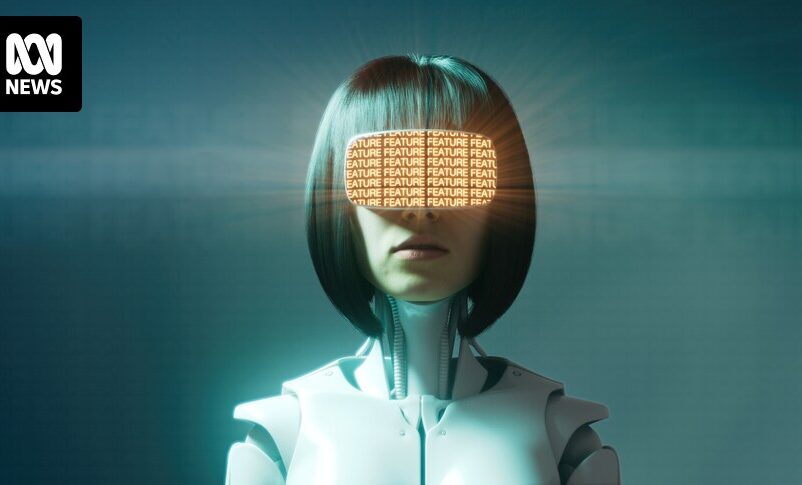
These days we can have a reasoned conversation with a humanoid robot, get fooled by a deep fake celebrity, and have our heart broken by a romantic chatbot.
While artificial intelligence (AI) promises to make life easier, developments like these can also mess with our minds, says Joel Pearson, a cognitive neuroscientist at the University of New South Wales.
We fear killer robots and out-of-control self-driving cars, but for Professor Pearson the psychological effects of AI are more significant, even if they’re harder to picture in our mind’s eye.
Loading…
The technology’s impact on everything from education to work and relationships is massively uncertain – something humans are not generally comfortable with, Professor Pearson tells RN’s All in the Mind.
“Our brains have evolved to fear uncertainty.”
What will be left for humans to do as AI improves? Will we feel like we have no purpose and meaning — and will we suffer the inevitable depression that comes with that?
There’s already cause for concern about the impact of AI on our mental wellbeing, Professor Pearson says.
“AI is already affecting us and changing our mental health in ways that are really bad for us.”
Humanoids and chatbots
One of the pitfalls of AI is our tendency to project human characteristics onto the non-human agents we interact with, Professor Pearson says.
So when ChatGPT communicates like a human we say it’s “intelligent” – especially when its words are articulated by a natural-sounding voice from a robot in the shape of a human.
Shift this dynamic to AI companions on your phone and we see just how vulnerable humans can be.
You might have heard about a chatbot called Replika, which was marketed as “always on your side” … and “always ready to chat when you need an empathetic friend”.
Subscribers paid for the chatbot to have “erotic role-play” features that included flirting and sexting, but when its maker toned down these elements, people who had fallen in love with their chatbot freaked out, Professor Pearson says.
The chatbot was no longer responding to their sexual advances.
“People were saying that their digital partner, their boyfriend or girlfriend in Replika was no longer themselves … and they were devastated by it.”
The chatbots also brought out a darker side in some Replika clients.
“Mainly males were bragging … about how they could have this sort of abusive relationship – ‘I had this Replika girl and she was like a slave. I would tell her, I’m going to switch her off and kill her … and she would beg me not to switch off’,” Professor Pearson says.
It was reminiscent of what happens in the dystopian science fiction series Westworld, where people let out their urges on artificial humans, he says.
Professor Pearson says there’s a lack of research on the implications of this aspect of human AI relationships.
“What does it do to us? … If I treat my AI like a slave and I’m rude to it and abusive, how does that then change how I relate to humans? Does that carry over?”
While an AI partner might appear to make an ideal companion, it’s a poor model for human relationships.
“Part of being in a relationship with humans is that there are compromises … The other person will challenge you, you will grow, you will have to face things together.
“And if you don’t have those challenges and people picking you up on things, you get whatever you want, whenever you want. It’s an addictive thing that is probably not healthy.”
The danger of deep fakes
Chatbots messing with our relationships is one thing, but deepfake images and videos can alter our very sense of what’s real and what’s fake.
“Not only can they look real, you can actually now do a real-time deepfake,” Professor Pearson says.
And here too, AI is being weaponised against women.
“I think 96 per cent of deepfakes so far have been non-consensual pornography.”
Who can forget the deepfake featuring Taylor Swift earlier this year.
One sexually explicit image of the pop star was viewed 47 million times before the account was suspended.
Once we are exposed to fake information, evidence suggests it can have a permanent impact, even if it is later revealed to be false, Professor Pearson says.
“You can’t really forget about it. That information sticks with you.”
And he says this is likely to be more the case with videos because they engage more senses and tug at our emotions.
While die-hard Swifties may forget about the deepfakes, others might be more influenced by them.
“People who know less of her will be a lot more vulnerable.”
This was because they would have a less developed mental model about the pop star that was more susceptible to influence from deepfakes, he says.
“[The deepfakes are] going to be patching into our long-term memory in ways that [make us] confused whether they’re real and not. And the catch is, even when we’re told they’re not real, those effects stick.”
The disturbing impacts of AI on our relationships and our grasp on reality itself could present a particular risk to teenagers.
Think of a school student subjected to images of themselves run through “nudifying apps” that use AI to undress a fully clothed person.
“While their brain is still developing … it’s going to do pretty nasty things to their mental health,” Professor Pearson says.
These dangers are exacerbated by young people spending less time face-to-face with others, which is linked to a decline in empathy and emotional intelligence, he says.
Cutting through the tech noise
Professor Pearson argues AI is presenting society with unprecedented challenges and the technology should not be dismissed as just another “tool”.
“You can’t compare it to tools. The industrial revolution, the printing press, TVs, computers… This is radically different in ways that we don’t fully understand.”
He’s calling for more research into the psychological impact of AI.
“I don’t want to make people depressed and anxious about AI,” Professor Pearson says.
“There’s a huge number of positives, but I’ve been pushing the psychological part of that because I don’t see anyone else talking about it.”
In the face of these changes, Professor Pearson suggests focusing on our humanity.
“[Figure out] what are the core essentials of being human, and how do you want to create your own life in ways that might be independent from all this tech uncertainty.”
“Is that going for a walk in nature, or is it just spending time with physical humans and loved ones?
“I think over the next decade we’re all going to be faced with soul-searching journeys like that. Why not start thinking about it now?”
Professor Pearson says he’s trying to apply these principles to his own life, without turning his back on technological advances.
“I’m trying to figure out how I can use AI to help me do more of the things I really enjoy.”
“My hope .. is that a lot of the things I’ve talked about won’t be as catastrophic as I’m making out.
“But I think raising the alarm now can avoid that pain and suffering later on and that’s what I want to do.”
Listen to the full episode “Scarier than killer robots”: why your mind isn’t ready for AI and subscribe to RN’s All in the Mind to explore other topics on the mind, brain and behaviour.
Get a selection of the best mental health content from across the ABC by subscribing to our monthly newsletter


